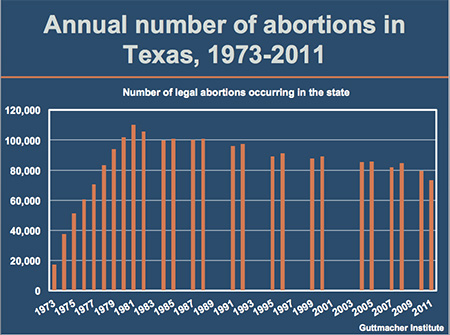More than four decades after the U.S. Supreme Court ruled on Roe v. Wade, few issues create division like debate over abortion. But pro-life and pro-choice advocates in Texas agree on at least one point: The number of abortions in the state has declined in recent years.
 The Guttmacher Institute—an abortion rights organization—reports the number of legal abortions in Texas peaked in 1981 at 110,110. By 2011, the number had dropped to 73,200, after 30 years of gradual decline.
The Guttmacher Institute—an abortion rights organization—reports the number of legal abortions in Texas peaked in 1981 at 110,110. By 2011, the number had dropped to 73,200, after 30 years of gradual decline.
And anecdotal evidence suggests the number may have dropped more dramatically since the Texas Legislature passed a bill requiring abortion clinics to meet the standards of surgical centers and requiring doctors who perform abortions to have admitting privileges at nearby hospitals.
Court to review Texas restrictions
The U.S. Supreme Court will review a case challenging that law—Whole Woman’s Health v. Cole—in March and likely will rule in early summer.
Last October, the Texas Policy Evaluation Project at the University of Texas reported the number of facilities in the state providing abortions dropped from 41 to 18 since April 2013. Researchers also pointed to a 13 percent decline in the number of abortions in the initial six months after the first portions of the law went into effect.
Calls to crisis pregnancy centers
Some women who likely would have contacted abortion providers in the past are calling crisis pregnancy center that promote abortion alternatives. For example, Thrive Women’s Clinic, an evangelical Christian crisis pregnancy center, reported the number of phone calls it received at its three Dallas locations from women seeking abortions nearly doubled in 2015. Thrive offers pregnancy tests, sonograms and counseling, but the clinic does not provide abortion services.
Initial year-end reports indicated Thrive Women’s Clinic received 2,416 calls in 2015 from women seeking abortions—a 47 percent increase. Through those calls, 267 women who initially wanted abortions and visited Thrive clinics chose to carry their babies full-term, including two mothers of twins. That’s compared to 224 in 2014.
Sign up for our weekly edition and get all our headlines in your inbox on Thursdays
‘Reaching more abortion-minded women’
“With fewer places in Texas performing abortions now, women are frantic to find a place to get one,” said Mary Jayne Fogerty, executive director of Thrive. “We are reaching more abortion-minded women than ever before.”
 Alysha Tyler, seen with her daughter, Alika, called a Dallas women’s clinic seeking an abortion. After viewing a sonogram, she chose against terminating her pregnancy. (Photo / Courtesy of Thrive Women’s Clinic) Thrive officials cite the example of women like Alysha Tyler, 25, who searched “Dallas abortion” on her smartphone and found the clinic’s contact information. When she visited the clinic for a free pregnancy test and sonogram, she discovered she was 10 weeks along in her pregnancy. After viewing the sonogram, she decided against terminating the pregnancy. She later gave birth to her daughter, Akila.
Alysha Tyler, seen with her daughter, Alika, called a Dallas women’s clinic seeking an abortion. After viewing a sonogram, she chose against terminating her pregnancy. (Photo / Courtesy of Thrive Women’s Clinic) Thrive officials cite the example of women like Alysha Tyler, 25, who searched “Dallas abortion” on her smartphone and found the clinic’s contact information. When she visited the clinic for a free pregnancy test and sonogram, she discovered she was 10 weeks along in her pregnancy. After viewing the sonogram, she decided against terminating the pregnancy. She later gave birth to her daughter, Akila.
Fogerty suspects other crisis pregnancy centers may have experienced similar increases in the number of calls received and women who chose alternatives to abortion.
“It has been the trend for quite some time, but it was more dramatic” in 2015, she said.
Unintended consequences?
However, the Texas Policy Evaluation Project points to another possible consequence of fewer abortion clinics in Texas.
“As wait times increase across Texas, the proportion of abortions performed in the second trimester would increase,” researchers reported. “If wait times increased to 20 days, which we are currently seeing in Dallas and Fort Worth, we estimate the number of abortions performed in the second trimester would nearly double.”
Other opponents of the Texas regulations insist by forcing women’s clinics that offer abortions out of business, women also are denied access to cancer screenings and other vital services.
Health and safety of women improved
Supporters of the Texas law insist the regulations improve the health and safety of women.
“Texas’ admitting-privileges and ambulatory-surgical-center requirements raise the standard of care for all abortion patients,” Texas Attorney General Ken Paxton, Solicitor General Scott Keller and others wrote in a brief filed with the Supreme Court.
Gus Reyes, director of Texas Baptists’ Christian Life Commission, likewise expressed assurance the restrictions that led to more than half the abortion clinics in the state closing should not negatively affect women’s access to health care.
“Texas Baptists worked for these changes to state law in 2013, and we believe they are important legal restrictions for abortion providers. We are particularly thankful Texas has experienced a decline in abortions, especially since the newest restrictions went into effect,” Reyes said.
“One of our great desires is that low-income and other vulnerable women continue to have access to quality health care, and we believe this can be accomplished within the current restrictions on abortions.”
















We seek to connect God’s story and God’s people around the world. To learn more about God’s story, click here.
Send comments and feedback to Eric Black, our editor. For comments to be published, please specify “letter to the editor.” Maximum length for publication is 300 words.